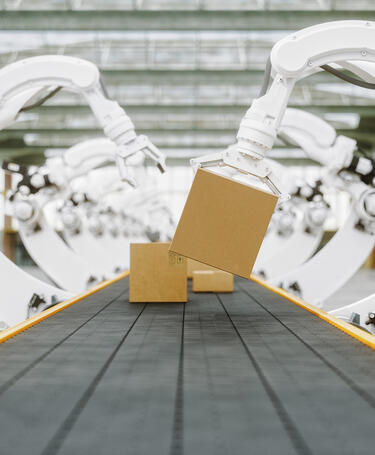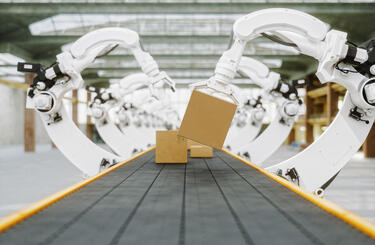
Artificial intelligence: A new revolution in quality manufacturing?
Progress indicator

Artificial intelligence is an integral part of everyday life, and it can revolutionise manufacturing processes, says CQI member Robert Kurek.
Artificial intelligence (AI) has been a part of everyday life for a while now, and is increasingly being applied to manufacturing processes to improve productivity, efficiency and quality control. So, how can AI innovation help revolutionise quality control in manufacturing processes to make manufacturing more efficient, cost-effective and reliable?
Quality control in manufacturing?
Quality control in manufacturing is the process of ensuring that products are manufactured to a consistent standard of quality. The process involves monitoring and inspecting raw materials, components and finished products to ensure they meet predetermined specifications. Quality control is essential for manufacturing companies to maintain customer satisfaction and retain a competitive edge in the market.
However, manufacturing companies face several challenges in ensuring quality control, including:
- High volumes of data: manufacturing processes generate vast amounts of data, which can be overwhelming to manage and analyse.
- Human error: quality control inspections can be time-consuming and require a high degree of accuracy, which can be challenging for humans to maintain consistently.
- Cost: quality control processes can be expensive to implement, especially for small and medium-sized enterprises (SMEs).
- Time: quality control processes can be time-consuming, and delays in the process can impact overall production schedules.
"Manufacturing companies that adopt AI technology for quality control can gain a competitive advantage over their peers."
Robert Kurek CQP MCQI, Quality Engineer at Neoperl
Leading the revolution
AI can revolutionise quality control in manufacturing processes by helping organisations to overcome the challenges faced in this area. There are several ways in which AI can assist:
- Predictive maintenance: AI can predict equipment failures and maintenance needs, minimising downtime and improving the overall performance of manufacturing operations.
- Automation: AI can automate the quality control process, reducing the need for manual inspection and analysis.
- Data analysis: AI can analyse large volumes of data quickly and accurately, providing insights that can help manufacturing companies optimise production processes and reduce defects.
- Real-time monitoring: AI can monitor manufacturing processes in real time, alerting operators to potential issues before they become critical.
Applications and benefits
AI can be used to automate visual inspections in manufacturing processes. Visual inspection is a critical component of quality control in manufacturing, and AI can be trained to recognise defects and anomalies in products, as well as analyse images of products taken by cameras to identify defects, such as cracks, scratches and discolouration. By automating visual inspections, manufacturing companies can reduce errors and increase the speed of inspections.
As outlined above, AI can be used to predict equipment failures and maintenance needs in manufacturing processes. Predictive maintenance involves analysing data from sensors and other sources to identify patterns and trends that indicate potential equipment failures. By identifying potential failures before they occur, manufacturing companies can minimise downtime and reduce maintenance costs.
Statistical process control involves analysing data from manufacturing processes in real time and providing operators with alerts when issues arise. By using AI to analyse data and identify patterns, manufacturing companies can reduce defects and improve the overall quality of their products.
AI-powered chatbots can be used to answer questions and provide support to manufacturing employees. They can help with troubleshooting issues and provide guidance on quality control processes – again, improving the efficiency and accuracy of quality control processes.
Competitive advantage
Manufacturing companies that adopt AI technology for quality control can gain a competitive advantage over their peers. By improving the quality of their products, increasing efficiency and reducing costs, these companies deliver greater value to their customers and differentiate themselves in a crowded marketplace.
While AI has the potential to revolutionise quality control in manufacturing processes, however, there are several challenges that companies may face in implementing AI technology.
AI relies on large volumes of data to learn and improve, and manufacturing companies may face challenges in managing and analysing this data. Companies must ensure they have the necessary infrastructure and resources in place to handle the amount of data generated by manufacturing processes.
Digital transformation and quality management – What are the relations?
Digital transformation is a term increasingly used in everyday life. But how is it connected with quality management? Galina Robertsone, Quality Manager for the Baltics region at HAVI Logistics, explains.
Quality World

Get the latest news, interviews and features on quality in our industry leading magazine.
Quality 4.0
Digital transformation is challenging the quality profession and its traditional principles, practices and tools
Become a member
Take your quality career to the next level by becoming a member of the CQI or an IRCA Certificated Auditor.